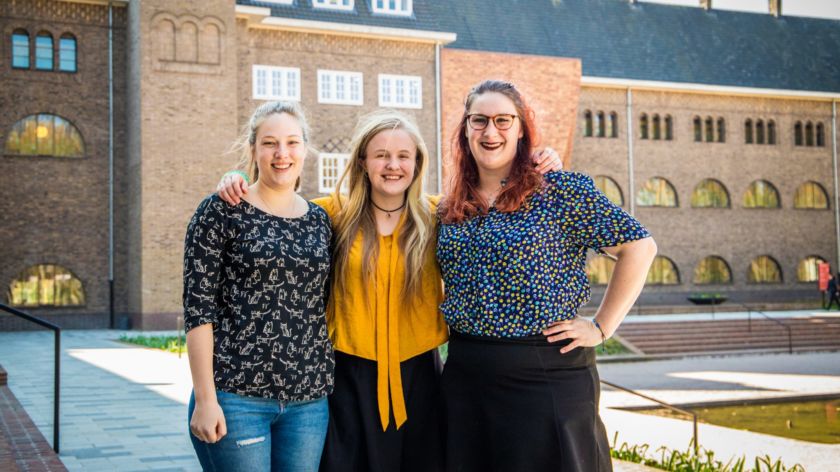AEGEE wants to fix Europe
-
 Hannah Sontag (middle) with her committee. Photo: Tom Hessels.
Hannah Sontag (middle) with her committee. Photo: Tom Hessels.
Every year, European organisation AEGEE sends ambassadors around Europe by train, to talk to students about current topics. Tomorrow, three ambassadors will visit Nijmegen, to discuss migration, the rise of populism and Euroscepticism. 'We want to show that young people are not alone.'
Every year, a new topic is tackled during AEGEE’s Europe on Track conference, aiming to provoke critical thinking in young people. Tomorrow is this year’s edition and for the first time in the project’s six-year-existence, three international AEGEE ambassadors are visiting Nijmegen as their last stop. This year’s focus: migration flows, populism and Euroscepticism.
Since the project was first introduced in 2013, it has — quite literally — come a long way. The concept is straight-forward: During a one-month-trip, 20 cities all over Europe are visited by ambassadors and workshops, lectures and discussions are organised in collaboration with local AEGEE chapters.
Sustainable
‘We’ve been organising for months.’, says Hannah Sonntag, one of the local AEGEE members involved in this year’s conference in Nijmegen. ‘Europe on Track is highly attractive, because it combines important topics with a body of people from different backgrounds, while, thanks to Interrail, being very sustainable.’
Especially the project’s temporal proximity to the election of the European parliament in May makes it more relevant than ever. ‘Take for example the recent decision the European parliament made about Article 13.’, says one of the ambassadors visiting Nijmegen this Thursday, Sandra Kebede, on the phone. ‘That was a slap in the face for many young Europeans.’
‘Europe has problems – but we can figure them out.’
Kebede is referring to Europe’s recently passed and highly controversial new copyright law. ‘We want to show that young people are not alone, because we share a reality and we can come together to actually make a difference. Europe on Track is not about glorifying a certain mindset, but, especially this year, about admitting that Europe has problems — but we can figure them out.’
Cherry picking
According to both Kebede and Sonntag, the project is encouraging an open discussion. ‘Nijmegen is very left-oriented, but Europe on Track is neither supposed to be a liberal nor a conservative event.’, says Sonntag, ‘This is not about cherry-picking the people we want to speak to and the opinions we want to discuss. It is thought to be inclusive of the whole political spectrum, because by not listening to other people’s concerns and opinions and simply putting them in a certain political corner, politics become highly polarised and that’s not what we want.’
To stir critical thinking, the project will host a variety of events between this Thursday and Sunday. Starting with the main conference on Thursday, which will involve workshops organised by AEGEE and the visiting ambassadors and lectures from Radboud professors. Additionally to regular workshops and lectures, a variety of candidates for the next European elections will take part in the event, including Sjoukje van Oosterhout (GroenLinks), Mark Lauriks (PvdA), Reinier van Lanschot (Volt Nederland), Sjoerd Bakker (VVD) and Delano van Luik (CDA).
Relevance
After the conference on Thursday, more events will follow on the weekend, including different workshops, a movie screening, discussions and a brunch. For that, AEGEE Nijmegen cooperated with many other non-profit organisations on campus, including Amnesty, Meet and Eat, Cultuur op de Campus and the debate organisation Trivium.
The involved AEGEE members hope for a lot of visitors due to the diversity of events and the topic’s relevance. ‘Topics like migration flows, populism and Euroscepticism have momentum right now.’, concludes Sonntag, ‘It was important to us that we make expert opinions accessible to everyone, so people get a better idea of the options they have in May. We want to give people both information and inspiration to further engage in discussions and conversations that are so highly relevant.’



